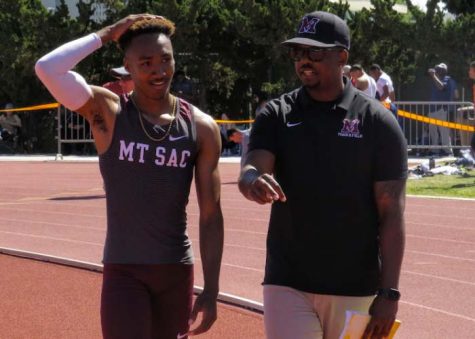How Our Athletes Balance It All
Part one in a series focusing on how packed schedules are affecting Mt. SAC’s student athletes physically and mentally
Coach Bob Jastrab, defensive lineman Lovel Mariney (58) and defensive back Aaron Smith (21) join medical staff to rally around their teammate as he deals with injuries from their game against Chaffey on Oct. 30.
Athletes at all levels find themselves overwhelmed and questioning whether or not they can juggle a busy sports schedule and fulfill academic requirements.
For our Mountie student-athletes, the schedule is grueling in all aspects and draining on their mental health.
According to the National Alliance on Mental Health, nearly 44 million adults experience mental illness in a given year including living with mental anxiety, depression, post-traumatic stress disorder and several other taxing conditions on the mental state.
Earlier this month, the tragic loss of Stanford’s goalie Katie Meyer, has inspired student-athletes everywhere to pause and ask themselves, “Am I ok?”

“School wellness centers have seen an uprise in mental health-related needs,” EdSource’s Carolyn Jones wrote.
Mounties are required to maintain at minimum a 2.0 GPA to stay eligible to play.
Some athletes, like 20-year-old freshman catcher Mireya “Ya-Ya” Amezcua, are taking 15 units this semester. Most non-athletes do not recognize the structured schedule athletes must stick to.
Amezcua manages her time by taking advantage of online classes.
“All my classes are asynchronous,” Amezcua said. “So, I mix it into my schedule whenever I have free time to get my assignments done.”
While half of her schedule is easy and accommodating, the other half is not.
“Monday through Friday, practice starts at noon,” she added. “Get treatment an hour before and stay for six hours total after classes through conditioning and game days.”
After juggling a dozen plates at once, some athletes are more proud of their academic work.

Former men’s pole vaulter Brandon Gilbert hung up his cleats to focus on academics. Balancing a busy schedule requires sacrifice. Most of the time, social sacrifice is the first to go.
“Honestly, my freshman year I was taking 17.5 units, my normal G.E. classes and doing track and field. My mental health was quite good,” he said. “I think I actually might have been too busy to focus on my mental health because I was constantly doing stuff.”
The constant workload results in having limited to no social life, which can trigger feelings of social isolation and loneliness.
Softball outfielder Arley Coronado (11) lamented this change to her social life.
“Having a busy schedule affects my social life because I really have no time to do other fun activities with my friends outside of softball,” Coronado said. “I’m with my teammates every day.”
Even if the athletes are not set to play, they are out practicing.
“My daily schedule consists of waking up, getting ready for practice, leaving to practice, get treatment and start conditioning.”
This repetitive practice often gets monotonous and exhausting.
“It’s tiring,” she added. “You don’t have time to go see your friend or hang out outside of your softball bubble.”

Relationships with people outside the team grow further apart as well.
“I think that we’ve been very distant lately, and I try to hang out with them but it’s very low,” she said. “It’s very hard to plan things when our schedules don’t match.”
Overscheduling is something several Mounties struggle with on and off the field.
Licensed professional counselor Jodie Clarke told Very Well Mind that the key to maintaining a good state of mental health is to not overwhelm yourself with an over-packed schedule:
“Being overly busy and exhausted can lead to an increase in stress and/or decreased self-esteem and may trigger more serious mental health disorders including anxiety disorders, depression, and substance use disorders,” Clarke added.
Recent trends found by the Pharmaceutical Journal indicate that antidepressant use in young adults has seen a 6% increase in prescription and consumption every month since 2019, and 41% overall since 2015.
While Mounties are not necessarily turning to drugs, balancing schoolwork and athletics remains a struggle for student athletes at Mt. SAC and abroad.

Email: [email protected]





